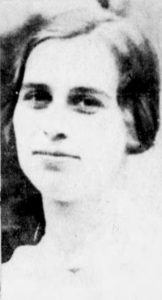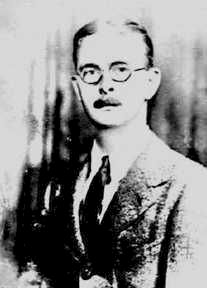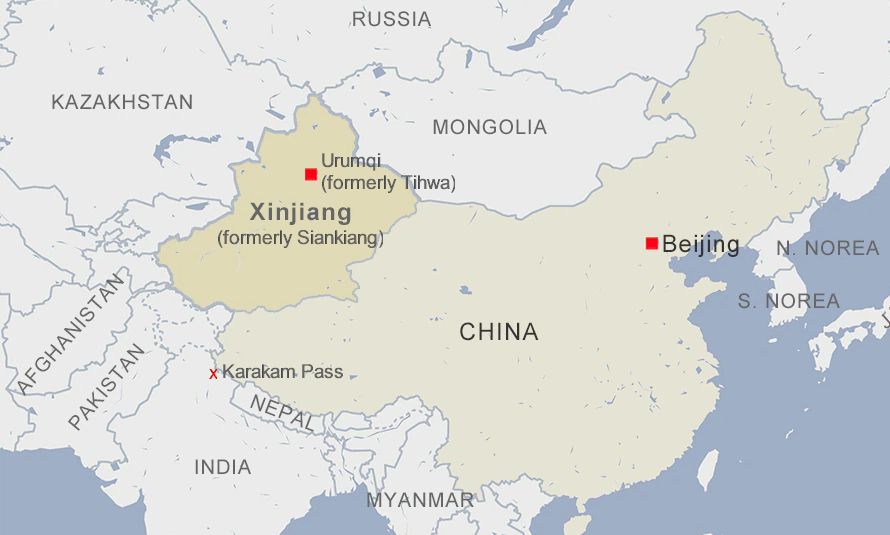Over the Hump – Crossing the Himalayas
See also Part 1 — Paxton Origins, Part 2 — The Young Hall Paxton, or Part 3 – Vincoe Charity Mushrush Paxton
After his marriage and a brief assignment to Tehran, Iran (1943), Hall Paxton returned to China as a Cultural Attaché (1944-1946) and later became the American Consul to Sinkiang, China’s northwest province (1946-1949) with a consulate in the city of Tihwa. His bride Vincoe completed her military service and joined him at that time. From their frontier post he reported back to the State Department about the efforts of various Communist factions – Chinese and Russian – to win military and political control of the area.
With communists threatening the area, with travel across China to its coast being impossible, and with leave long overdue, Hall and Vincoe decided to flee south across the Himalayan Mountains. With Hall directing the effort, Vincoe was responsible for the health of a group of 25 adults, six children, and a train of ponies, donkeys, camels, and sheep during their three months of travel.
Initially, their party, including Chinese nationalists, left Tihwa by truck and jeep. Their first ten days of driving took them 1,000 miles across rough roads through the depths of the Turfan Depression, one of the world’s lowest spots, and around the vast Takla-Makan desert where temperatures reached 108°.
At primitive Kashgar the party was held up for three weeks, haggling for a caravan to take them into India. From Kashgar, the route led 500 miles to Kargalik, through the walled, rug-making, Moslem town of Yarkand. Mutinous Chinese Nationalist troops, who had not been paid for seven months, were in possession of Yarkand, and it took Paxton’s smoothest Chinese to talk his party’s way through. Paxton dismissed the truck and the jeeps and hired ten caravan men with 33 horses and a handful of camels and donkeys.

Four days later, the travelers passed the last inhabited outpost on China’s side of the Himalayas. As they crossed and recrossed treacherous river rapids, babies and baggage splashed repeatedly into the icy stream. At 15,800-foot-high Yngi Pass, the hearts of the horses began to pound dangerously. Vincoe Paxton helped slit the beasts’ nostrils so that bleeding would keep their arteries from bursting. She swatted maggots from the festering wounds torn by saddle ropes on the animals’ sides. Nausea, dizziness, frostbite, and insomnia meanwhile began to affect the travelers themselves. “It made us feel like idiots,” said Vincoe. In 18,600-foot Karakoram Pass, the sun burned their faces, and their tea froze before they could drink it.
Some twenty days later, Paxton’s party reached the first settlement in Ladakh Province, on the Indian side of the Himalayas. But the worst day was still to come. At Kardang Pass the travelers faced a 400-foot glacier, slick as mirror-glass and tilted at a 45° angle. They dismounted and crept on foot up a narrow path hacked in the ice. Donkeys and horses had to be helped up the treacherous slope.
When they tottered into Ladakh’s capital, the Indian army made them comfortable for the night and sent out yaks for their abandoned baggage. A U.S. embassy plane flew the travelers to Delhi. They had covered some 2,500 miles in ten weeks. Hall was again cited for distinguished foreign service while Vincoe was commended in a letter from Dean Acheson, Secretary of State.
Returning to the United States, Hall made radio broadcasts to Asia for the Voice of America. He gave a series of talks on American foreign policy, especially Asiatic policy, beamed to the Iron Curtain countries
After China
 Hall was again assigned to Iran, this time as Consul, in 1951, where Vincoe joined him in Isfahan.
Hall was again assigned to Iran, this time as Consul, in 1951, where Vincoe joined him in Isfahan.
John Hall Paxton died suddenly of a heart attack in Isfahan, Iran, on June 23, 1952, at the age of 53. He was buried in Tehran after services at the English church. His mother, Una Hall Paxton, who was already planning a visit at the time of his death, joined Vincoe in Iran in October. Una passed on Danville in July 1955.
In 1962, Vincoe was a member of a world health tour made by the World Health Organization in Geneva., Switzerland. The group examined health education programs I Japan, Formosa, Hong Kong, Thailand, Burma, India, Pakistan, Egypt, Jordan, Israel, Turkey, and Greece.
Vincoe Mushrush Paxton, the beloved wife of the late J. Hall Paxton, passed in St. Louis on June 27, 1997, at the age of 91. Graveside services were held at the National Cemetery at Jefferson Barracks.
Much more remains to be discovered about Hall and Vincoe from his papers and personal correspondence housed in the Yale library.
- Protestant Missions in China, Wikipedia
https://en.wikipedia.org/wiki/Protestant_missions_in_China - Pearl S. Buck, Wikipedia
https://en.wikipedia.org/wiki/Pearl_S._Buck - Over The Hump, Time Magazine
http://content.time.com/time/subscriber/article/0,33009,934276,00.html - John Hall Paxton papers at Yale
https://archives.yale.edu/repositories/12/resources/3848 - St. Joseph (Missouri) Gazette, 1 Mar 1933
- St. Louis Post-Dispatch, 29 Jan 1997
- Moberly (Missouri) Monitor-Index
- Freeport (IL) Journal Standard
- Selma (AL) Times
- Montgomery (AL) Advisor
- Daily Times (Richmond, VA)
- Virginian-Pilot (Norfolk)
- The Bee (Danville, VA)
